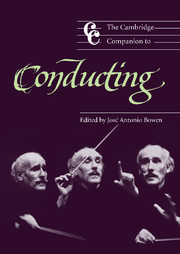13 - The English tradition
from Part II - History
Published online by Cambridge University Press: 28 September 2011
Summary
If there is a clear turning point in the history of British conducting – a point at which the modern era may be said to begin – it is marked by the arrival in England of the Italian conductor Michele Costa (1808–84). In 1829, Costa was sent by the composer Niccolò Zingarelli to direct a Birmingham performance of the latter's Cantata on the Book of Isaiah, Chapter XII, though in the event he only sang in it. The following year Costa settled in London, where he became maestro al piano at the King's Theatre and adopted the anglicized Christian name Michael. He made his mark quickly and indelibly. In less than two years he had abolished the prevailing system of dual leadership (see chapter 8) at the King's Theatre, and established himself as sole director, with the baton as his tool and symbol of authority.
London audiences had seen visiting conductors use the baton before, notably Spohr, Weber, and Mendelssohn; but as a resident Costa was able to carry on a sustained campaign. Nearly four decades after Costa's appointment at the King's Theatre, George Bernard Shaw wrote that
by dint of constantly beating time, Sir Michael has secured the foremost place in the very thin ranks of our conductors. His place is undisputed. With the exception of Mr. August Manns, whose labors are confined to the nobler field of abstract music, he is the only chief under whose bâton orchestras display good training. The merits which he successfully cultivates are precision and refinement, and both go so far in music that their attainment alone would entitle him to his high position.
- Type
- Chapter
- Information
- The Cambridge Companion to Conducting , pp. 178 - 190Publisher: Cambridge University PressPrint publication year: 2003



